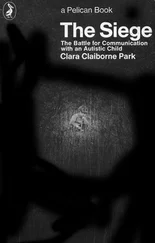Clara Park - Exiting Nirvana
Здесь есть возможность читать онлайн «Clara Park - Exiting Nirvana» весь текст электронной книги совершенно бесплатно (целиком полную версию без сокращений). В некоторых случаях можно слушать аудио, скачать через торрент в формате fb2 и присутствует краткое содержание. ISBN: , Жанр: Психология, на английском языке. Описание произведения, (предисловие) а так же отзывы посетителей доступны на портале библиотеки ЛибКат.
- Название:Exiting Nirvana
- Автор:
- Жанр:
- Год:неизвестен
- ISBN:0-316-69117-8
- Рейтинг книги:4 / 5. Голосов: 1
-
Избранное:Добавить в избранное
- Отзывы:
-
Ваша оценка:
- 80
- 1
- 2
- 3
- 4
- 5
Exiting Nirvana: краткое содержание, описание и аннотация
Предлагаем к чтению аннотацию, описание, краткое содержание или предисловие (зависит от того, что написал сам автор книги «Exiting Nirvana»). Если вы не нашли необходимую информацию о книге — напишите в комментариях, мы постараемся отыскать её.
All illustrations are by Jessy Park.
Exiting Nirvana — читать онлайн бесплатно полную книгу (весь текст) целиком
Ниже представлен текст книги, разбитый по страницам. Система сохранения места последней прочитанной страницы, позволяет с удобством читать онлайн бесплатно книгу «Exiting Nirvana», без необходимости каждый раз заново искать на чём Вы остановились. Поставьте закладку, и сможете в любой момент перейти на страницу, на которой закончили чтение.
Интервал:
Закладка:
We had been glad when the psychologist told us our three- year-old had no intellectual deficiency. We — and the psychologist — should have known. Jessy was brilliant at the form-board, but that was all she could do. She couldn’t identify common objects, even by pointing. She couldn’t follow the simplest verbal directions. She could find nothing to do with the doll family. Silently, accurately, the testing recorded what we would fully comprehend only later: that it was in the ordinary world of human living and human relationships that the hardest work was to come. Inside the folder marked Social, spilling out of it into the suitcase, are the records of that work, continual and continuing, on the necessary conditions of life outside Nirvana. It was, and is, the most important work of all.
Intellectual achievement is useless without social development. My grandmother knew this. Long before Jessy was even thought of she used to say to me (to my intense irritation), «Be good, sweet child, and let who will be clever». But we are a clever family, and it’s natural that we should value intellectual achievement, natural too that in years when there was little to rejoice at we rejoiced in Jessy’s primes. But one cannot live in a world of prime numbers. It helped put things in proportion when we met, as we sometimes did, other autistic young people who were intellectually far more advanced than Jessy, but whose demeanor and behavior made it unlikely that anyone would care to spend much time with them. Unquestionably Jessy has intellectual capacities that have not been developed. She might have learned to work with computers. She might have learned calculus. She might have learned mathematical processes of which I know only the names. Yet though I regret possibilities left unpursued, I do not regret that instead of mathematics Jessy’s energies, and ours, have gone into the development of as attractive a human being as the circumstances allowed.
Until Jessy was in her teens, all our teaching had been what is now called «incidental». We had no set plan, no list of goals. We searched the environment for learning opportunities and took them as they arose. We latched onto her interests — which meant her obsessions — and did what we could with them. Knowing her as we did, we could nudge, even push, and draw back as we approached her level of tolerance, abandoning that particular area of learning to another day, another year. It was a regime that minimized frustration or failure, and it was reasonably successful.
But to the degree that it was successful, it could not last. The more Jessy entered the world, the more she was exposed to the unpredictabilities and uncertainties that were so hard for her to tolerate. New experiences poured in upon her, bringing new opportunities but also new demands. And for a long time it was the demands, not the opportunities, that were experienced most acutely.
It is in the nature of learning and growing that as more is mastered, more is expected. Jessy now had to try to do many more things she didn’t like or that she couldn’t do or did badly. Now not only we, but she herself, experienced failure and frustration, in the bus, in the classroom, in the supermarket, in the street. Because less is forgiven a teenager than a child, she had to work harder than ever before on the do’s and don’ts of social behavior. She couldn’t scream in the school bus (but she did). She couldn’t push the teacher against the wall (but she did). She couldn’t smell people, or go up to them and touch their clothes. She couldn’t cut into the cafeteria line. She couldn’t scream when she typed a period for a comma, or bite her hand. The list of don’ts of social living is endless. So is the list of do’s.
It was at this point in Jessy’s life that we encountered the little mechanism that was to make such a difference, to bring so much, so fast, within her list of capabilities. She was just fourteen.
It was a golf counter. Golfers wear it on their wrists to keep score. Jessy had seen one on another child, much less severely autistic, who had come to visit. It was everything she liked: it was mechanical, it was easy to use, it was predictable, it was numerical, it clicked. Her birthday was coming up and she wanted one — the first present besides candy she’d ever asked for. So it was under the best possible circumstances that we began our homemade program in behavior modification.
Behavior modification is not an attractive term, and the term «operant conditioning» is worse. Who wants to believe that learning is a matter of conditioning, of rewards and penalties, that what worked for B. F. Skinner’s pigeons will work for her child? We knew about behavior modification; we’d heard Ivar Lovaas speak at autism conventions. We were impressed with his pioneering work with autistic children, but we were also complacent. We’d already managed to teach toileting and self-help skills; we’d come a long way with language. Did we need this? Did Jessy?
But Jessy wanted that counter. We followed her lead, and she led us, all unknowing, as close as we’ve ever come to that thing so often claimed, so seldom found, a breakthrough.
The program had two elements: points for desirable behaviors (leading, if the number agreed on was reached, to a Popsicle at the end of the day), and a written contract. [33] For more, see D. Park, „Operant Conditioning of a Speaking Autistic Child“, Journal of Autism and Childhood Schizophrenia, vol. 4, no. 2 (1974), PP- 189–191.
It was important, I think, that Jessy was involved in both, that the process was not entirely imposed from without. It was Jessy who awarded the points, or subtracted them for such behaviors as hitting and screaming, whether or not I was present. Sometimes she made her own bar graph of the week’s numbers, in coordinated colors (lemonlemonlemon lime!). The day she reached 145:/2 when the goal was only 100, I realized that for mathematical Jessy not the Popsicle but the points themselves were her reward. The Popsicles were dropped unnoticed.
Even more important, Jessy and I negotiated the contract together. Shared attention! We made of our Sunday contract sessions a social occasion, both actually, as we sat side by side on her bed and reviewed the successes and failures of the past week, and theoretically, as I took the opportunity to talk about people’s behavior in general. Her enjoyment was obvious; much as she resisted reading, she loved reading the contracts, which I kept easily within her own vocabulary and comprehension.
One day, after more than a year of this, I set a long-term goal.
I had taught Jessy to swim in the usual way, without points, but she would still not go out of her depth or swim more than the two or three feet necessary to reach my outstretched arms. If we contracted for 1000 points for swimming the length of the pool, I thought, we’d have something to work up to during the next year. What happened? That very night she walked up to the deep end of the pool, jumped in, and swam the 75-foot length eight times.
Another incident, though less spectacular, had greater significance for social development. At this time, though Jessy was friendly, even affectionate with people she knew well, we had been unable to persuade her to make the simplest greeting: no hello, no smile, no looking in the eye. On the contract, then, went «Hello» (1 point). Plus a proper name: «Hello, Mrs. Smith» (2 points). Plus eye contact (3 points). Plus a fourth point for doing it all «spontaneously»; in Jessy’s words, «without told. Suddenly we began to get reports from school; from Mrs. Smith and Mrs. Jones and the speech therapist whose father was a London psychoanalyst and who had been working with Jessy for more than a year. „Hello, Mrs. Smith“. The click-click-click-click was hardly noticeable. And the new greetings, of course, elicited smiles and delight; Mrs. Smith and Mrs. Jones did not have to be programmed to deliver social reinforcement. Jessy was learning far more than mechanical greeting behavior. She was learning something even more foreign to her — to enjoy approval, since points and approval went together. If Jessy can now say, „I’m proud of myself“, and mean it; if she can repeat, „If at first you don’t succeed, try, try again“, and understand it, it is the result not of deep therapy that penetrated fourteen years of autistic refusal, but of clear behavioral specifications and that little counter.
Читать дальшеИнтервал:
Закладка:
Похожие книги на «Exiting Nirvana»
Представляем Вашему вниманию похожие книги на «Exiting Nirvana» списком для выбора. Мы отобрали схожую по названию и смыслу литературу в надежде предоставить читателям больше вариантов отыскать новые, интересные, ещё непрочитанные произведения.
Обсуждение, отзывы о книге «Exiting Nirvana» и просто собственные мнения читателей. Оставьте ваши комментарии, напишите, что Вы думаете о произведении, его смысле или главных героях. Укажите что конкретно понравилось, а что нет, и почему Вы так считаете.



![Майкл Азеррад - Come as you are - история Nirvana, рассказанная Куртом Кобейном и записанная Майклом Азеррадом [litres]](/books/392533/majkl-azerrad-come-as-you-are-istoriya-nirvana-ra-thumb.webp)



![Эверетт Тру - Nirvana - Правдивая история [litres]](/books/399241/everett-tru-nirvana-pravdivaya-istoriya-litres-thumb.webp)




